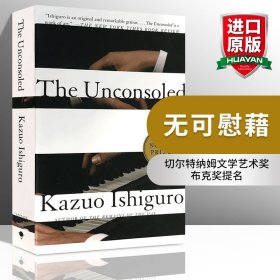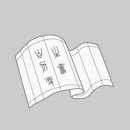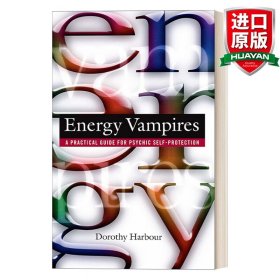
英文原版 The Unconsoled 无可慰藉 石黑一雄 Kazuo Ishiguro 英文版 进口英语原版书籍
书籍内容简介可联系客服查阅,查书找书开票同样可以联系客服
¥ 82 ¥ 82 九五品
库存18件
广东广州
认证卖家担保交易快速发货售后保障
作者Ishiguro, Kazuo
出版社Vintage
ISBN9780679735878
出版时间1996-10
装帧平装
定价82元
货号YB-1298
上书时间2024-03-13
- 最新上架
商品详情
- 品相描述:九五品
- 商品描述
-
内容摘要
书名:The Unconsoled 无可慰藉 作者:Kazuo Ishiguro 出版社名称:Vintage 出版时间:1996 语种:英文 ISBN:9780679735878 商品尺寸:13.2 x 2.8 x 20.2 cm 包装:平装 页数:535 The Unconsoled《无可慰藉》是石黑一雄的第四部小说,获得切尔特纳姆文学艺术奖,布克奖提名。本书秉承石黒一雄的一贯风格,外表清淡,内心强大。卡夫卡式的叙事,大量的超现实描写,变幻莫测的场景,走马观花般的人物,使读者仿佛置身于主人公的梦境之中。 故事表面上讲的是一个小城的一群人的人生百态,透过纸页,却看到了作者对当代人的生存状态的深刻思考。如同小说中的瑞德及其他所有人一样,行走在当代社会,人们的心灵全都带着自己的伤口,被困在各自形形色色的大泡泡中,无法与人沟通,也无法从外界获得帮助与慰藉。 From the winner of the Nobel Prize in Literature and author of the Booker Prize–winning novelThe Remains of the Day, here is a novel that is at once a gripping psychological mystery, a wicked satire of the cult of art, and a poignant character study of a man whose public life has accelerated beyond his control. The setting is a nameless Central European city where Ryder, a renowned pianist, has come to give the most important performance of his life. Instead, he finds himself diverted on a series of cryptic and infuriating errands that nevertheless provide him with vital clues to his own past. InThe Unconsoled Ishiguro creates a work that is itself a virtuoso performance, strange, haunting, and resonant with humanity and wit. Review “A work of great interest and originality.... Ishiguro has mapped out an aesthetic territory that is all his own... frankly fantastic [and] fiercer and funnier than before.” —The New Yorker 小说描写一位钢琴演奏家在一座谜样的城市里所经历的谜样的几天。他忽而是旁观者,忽而又被卷入其中,所见之人无不一往情深却又执迷不悟;所遇之事无不怪异荒诞,充满变数。在这座人心为怪诞的艺术价值观所左右的城市里,在努力寻找梦境出口,为这一切寻求解释的过程中,他渐渐意识到自己正面临人生严酷的一场演奏。 The Unconsoled is at once a gripping psychological mystery, a wicked satire of the cult of art, and a poignant character study of a man whose public life has accelerated beyond his control. The setting is a nameless Central European city where Ryder, a renowned pianist, has come to give the most important performance of his life. Instead, he finds himself diverted on a series of cryptic and infuriating errands that nevertheless provide him with vital clues to his own past. InThe Unconsoled Ishiguro creates a work that is itself a virtuoso performance, strange, haunting, and resonant with humanity and wit. 石黑一雄(Kazuo Ishiguro),日裔英国小说家,1954年生于日本长崎。1989年获得“布克奖”,与奈保尔、拉什迪并称“英国文坛移民三雄”。被英国皇室授勋为文学骑士,并获授法国艺术文学骑士勋章。 2017年,石黑一雄获得诺贝尔文学奖。瑞典学院给出的获奖理由为“石黑一雄的小说,以其巨大的情感力量,发掘了隐藏在我们与世界联系的幻觉之下的深渊。” 石黑一雄文体以细腻优美著称,几乎每部小说都被提名或得奖,其作品已被翻译成二十八种语言。 虽然拥有日本和英国双重的文化背景,但石黑一雄却是极为少数的、不专以移民或是国族认同作为小说题材的亚裔作家之一。他致力于写出一本对于生活在任何一个文化背景之下的人们,都能够产生意义的小说。于是,石黑一雄的每一本小说几乎都在开创一个新的格局,横跨了欧洲的贵族文化、现代中国、日本,乃至于1990年代晚期的英国生物科技实验,而屡屡给读者带来耳目一新的惊喜。 石黑一雄的出版作品如下:1982年《群山淡景》(A Pale View of Hills),获得“英国皇家学会”(Royal Society of Literature)温尼弗雷德.霍尔比奖(Winifred Holtby Prize)。1986年《浮世画家》(An Artist of the Floating World),获英国及爱尔兰图书协会颁发的“惠特布莱德”年度小说奖(Whitbread Book of the Year Award)和英国布克奖(Booker Prize)的提名。1989年《长日留痕》(The Remains of the Day),荣获英国布克奖,并荣登《出版家周刊》的畅销排行榜。1995年《无可慰藉》(The Unconsoled)赢得了“契尔特纳姆”文学艺术奖(Cheltenham Prize)。2000年《我辈孤雏》(When We Were Orphans),再次获得布克奖提名。2005年《别让我走》(Never Let Me Go),也入围了布克奖后决选名单,并获全世界文学奖奖金zui高的“欧洲小说奖”(European Novel Award)。2009年短篇故事集《夜曲》(Nocturne)。2015年,睽违十年后推出长篇小说《被掩埋的巨人》,再度席卷欧美与亚洲书市。 Kazuo Ishiguro is the 2017 winner of the Nobel Prize in Literature. His work has been translated into more than 40 languages. BothThe Remains of the Day andNever Let Me Go have sold more than 1 million copies, and both were adapted into highly acclaimed films. Ishiguro’s other work includesThe Buried Giant,Nocturnes,A Pale View of the Hills, andAn Artist of the Floating World. The taxi driver seemed embarrassed to find there was no one-not even a clerk behind the reception desk-waiting to welcome me. He wandered across the deserted lobby, perhaps hoping to discover a staff member concealed behind one of the plants or armchairs. Eventually he put my suitcases down beside the elevator doors and, mumbling some excuse, took his leave of me. The lobby was reasonably spacious, allowing several coffee tables to be spread around it with no sense of crowding. But the ceiling was low and had a definite sag, creating a slightly claustrophobic mood, and despite the sunshine outside the light was gloomy. Only near the reception desk was there a bright streak of sun on the wall, illuminating an area of dark wood panelling and a rack of magazines in German, French and English. I could see also a small silver bell on the reception desk and was about to go over to shake it when a door opened somewhere behind me and a young man in uniform appeared. “Good afternoon, sir,” he said tiredly and, going behind the reception desk, began the registration procedures. Although he did mumble an apology for his absence, his manner remained for a time distinctly off-hand. As soon as I mentioned my name, however, he gave a start and straightened himself. “Mr Ryder, I’m so sorry I didn’t recognise you. Mr Hoffman, the manager, he was very much wanting to welcome you personally. But just now, unfortunately, he’s had to go to an important meeting.” “That’s perfectly all right. I’ll look forward to meeting him later on.” The desk clerk hurried on through the registration forms, all the while muttering about how annoyed the manager would be to have missed my arrival. He twice mentioned how the preparations for “Thursday night” were putting the latter under unusual pressure, keeping him away from the hotel far more than was usual. I simply nodded, unable to summon the energy to enquire into the precise nature of “Thursday night”. “Oh, and Mr Brodsky’s been doing splendidly today,” the desk clerk said, brightening. “Really splendidly. This morning he rehearsed that orchestra for four hours non-stop. And listen to him now! Still hard at it, working things out by himself.” He indicated the rear of the lobby. Only then did I become aware that a piano was being played somewhere in the building, just audible above the muffled noise of the traffic outside. I raised my head and listened more closely. Someone was playing a single short phrase-it was from the second movement of Mullery’s Verticality-over and over in a slow, preoccupied manner. “Of course, if the manager were here,” the desk clerk was saying, “he might well have brought Mr Brodsky out to meet you. But I’m not sure . . .” He gave a laugh. “I’m not sure if I should disturb him. You see, if he’s deep in concentration . . .” 1234567
— 没有更多了 —












以下为对购买帮助不大的评价